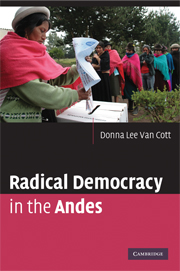Book contents
- Frontmatter
- Contents
- Acknowledgments
- List of Acronyms
- 1 Introduction: The Political and Cultural Origins of Democratic Institutional Innovation
- 2 The Legal and Political Context for Municipal Reform in Bolivia and Ecuador
- 3 Mayoral Leadership and Democratic Institutional Innovation
- 4 Political Parties, Civil Society, and Democratic Institutional Innovation
- 5 Institutional Innovation in Ecuador
- 6 Institutional Innovation in Bolivia
- 7 Conclusion: An Interaction Model of Democratic Institutional Innovation
- References
- Index
7 - Conclusion: An Interaction Model of Democratic Institutional Innovation
Published online by Cambridge University Press: 05 September 2012
- Frontmatter
- Contents
- Acknowledgments
- List of Acronyms
- 1 Introduction: The Political and Cultural Origins of Democratic Institutional Innovation
- 2 The Legal and Political Context for Municipal Reform in Bolivia and Ecuador
- 3 Mayoral Leadership and Democratic Institutional Innovation
- 4 Political Parties, Civil Society, and Democratic Institutional Innovation
- 5 Institutional Innovation in Ecuador
- 6 Institutional Innovation in Bolivia
- 7 Conclusion: An Interaction Model of Democratic Institutional Innovation
- References
- Index
Summary
Some observers – anthropologists, philosophers, human rights' activists, development professionals – were horrified when indigenous peoples shed their political innocence and entered formal politics in significant numbers in the mid-1990s. Would this be the end of “pure” native cultures uncorrupted by Western politics? Would we no longer have living, morally superior models of prepolitical human relations to juxtapose to modern, complex, failing states?
For the most part indigenous citizens (and not a few political scientists) were thrilled with the prospect of empowering Latin America's most-excluded groups and with the possible implications for democracy of this promising and unexpected turn of events. As a Pachakutik militant explained to me one afternoon in Quito in July 2005,
This is the reality today. Now, what happens is that the indigenous peoples have become politicized. We have maintained and we have ratified that we are a political organization, because politics is a science, no?, that seeks the common good. Given that the society in its entirety – not just the indigenous – is assuming a political attitude, the rich that run the country don't have to be políticos. And many people assume this, as if politics were bad and, thus, they should stay away from it. And we say that no, we are political. Our organizations are political. All of our actions, all of our activities are political actions.
(My translation; interview, Alberto Yumbay, July 7, 2005.)- Type
- Chapter
- Information
- Radical Democracy in the Andes , pp. 210 - 236Publisher: Cambridge University PressPrint publication year: 2008

